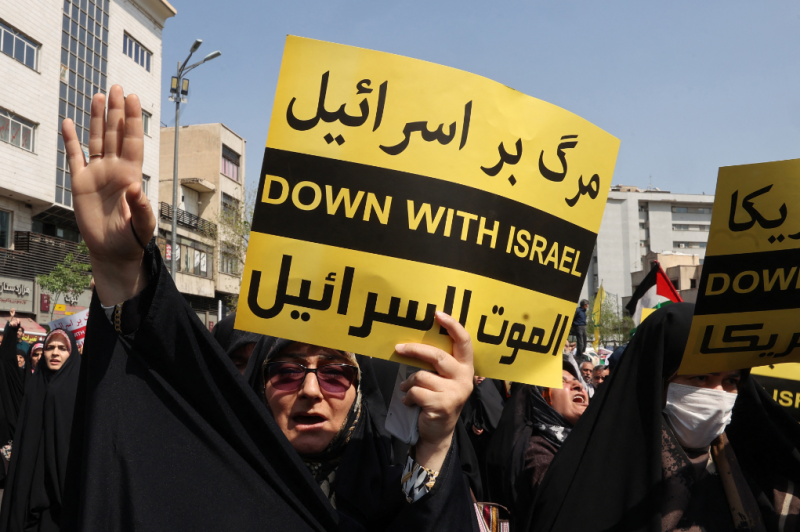
Iranians wave the flags of Palestine and Iran as they gather during an anti-Israel demonstration after the Friday noon prayer in Tehran on April 19, 2024. (Credit: Atta Kenare/AFP)
When Iran launched the Honest Promise Operation on Saturday evening — the first to target Israel directly — it was announcing a change of equation with its enemy. Tehran marked a strategic turning point with the dispatch of over 300 drones and missiles in retaliation for the attack on its consular annex in Damascus on April 1. The attack attributed to Tel Aviv killed seven Iranian Revolutionary Guard cadres.
Despite threats of a response and the risk of a regional conflagration, Israel insisted it had to react to the attack on its territory. The three explosions in the central Iranian province of Isfahan on Friday morning — which bear the hallmark of Israel — indicate that the latter intends to resume the shadow war it has waged against Iran for decades. The Islamic Republic accepts this configuration, attempting to minimize the significance of Friday's incident. How is the shadow war between the two enemies playing out?
This confrontation is indirect and characterized by a wide repertoire ranging from targeted attacks to the destruction of infrastructure and the hacking of computer systems, all of which are rarely claimed. According to this modus operandi, Tel Aviv targets two pillars of the Islamic Republic: The Revolutionary Guards and Iran's nuclear program. It does so through assassinations, which have increased since Oct. 7 in countries belonging to the "Axis of Resistance" led by Tehran.
 (Credit: Jaimee Lee Haddad/L'Orient Today)
(Credit: Jaimee Lee Haddad/L'Orient Today)
Tehran has been accused of carrying out attacks against Jewish and Israeli interests around the world. Last week, the Islamic Republic was found guilty by a Buenos Aires court of masterminding the 1994 bombing of the Argentine Israelite Mutual Association (AMIA) by the Lebanese Hezbollah, a charge it has denied. Iran thus often mobilizes its network of militias active in the region, hiding behind "plausible deniability" to avoid taking direct responsibility for actions committed.
In addition to assassinations, which also targeted "Axis of Resistance" officials between 2019 and 2021, Israel has attacked at least a dozen ships bound for Syria mostly carrying cases of Iranian oil, reports the Wall Street Journal, citing Israeli officials. Tehran took upon itself the right to respond like in December 2021, when an explosion off the coast of Oman hit an Israeli commercial vessel.
 (Credit: Jaimee Lee Haddad/L'Orient Today)
(Credit: Jaimee Lee Haddad/L'Orient Today)
While Iranian cyberattacks against Israeli governmental organizations are also common, the war in Gaza has intensified these attacks. In recent months, Israel has suffered 800 cyberattacks against its hospitals and army, a threefold increase from the previous year. On Feb. 24, Haifa's Rambam Hospital reported that it had foiled an attempted cyberattack on its computer system. At the same time, Israel has stepped up its hacking and sabotage operations, most recently in February 2024.
 (Credit: Jaimee Lee Haddad/L'Orient Today)
(Credit: Jaimee Lee Haddad/L'Orient Today)
This article was originally published in French on L'Orient-Le Jour. Translation by Yara Malka.